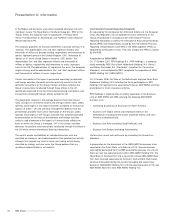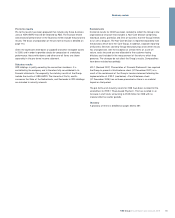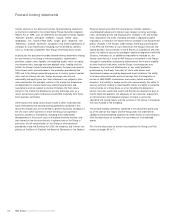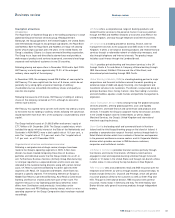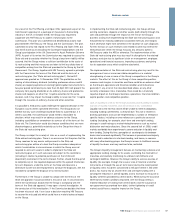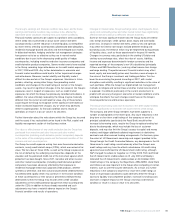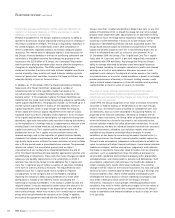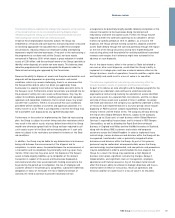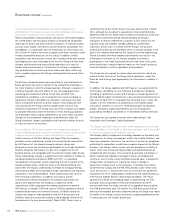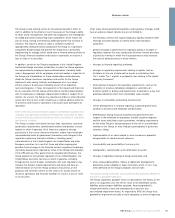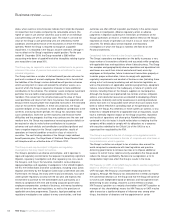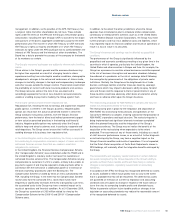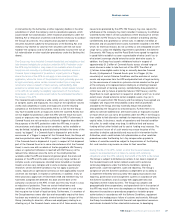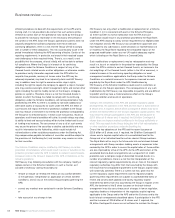RBS 2009 Annual Report Download - page 60
Download and view the complete annual report
Please find page 60 of the 2009 RBS annual report below. You can navigate through the pages in the report by either clicking on the pages listed below, or by using the keyword search tool below to find specific information within the annual report.RBS Group Annual Report and Accounts 200958
In addition, there is also a risk that corporate and institutional
counterparties with credit exposures may look to reduce all credit
exposures to banks, given current risk aversion trends. It is possible that
credit market dislocation becomes so severe that overnight funding from
non-government sources ceases to be available.
Like many banking groups, the Group relies on customer deposits to
meet a considerable portion of its funding. Furthermore, as part of its
ongoing strategy to improve its liquidity position, the Group is actively
seeking to increase the proportion of its funding represented by
customer deposits. However, such deposits are subject to fluctuation
due to certain factors outside the Group’s control, such as a loss of
confidence, increasing competitive pressures or the encouraged or
mandated repatriation of deposits by foreign wholesale or central bank
depositors, which could result in a significant outflow of deposits within
a short period of time. There is currently heavy competition among UK
banks for retail customer deposits, which has increased the cost of
procuring new deposits and impacted the Group’s ability to grow its
deposit base. An inability to grow, or any material decrease in, the
Group’s deposits could, particularly if accompanied by one of the other
factors described above, have a negative impact on the Group’s ability
to satisfy its liquidity needs unless corresponding actions were taken to
improve the liquidity profile of other deposits or to reduce assets. In
particular, the liquidity position of the Group may be negatively
impacted if it is unable to achieve the run-off and sale of non-core and
other assets as expected. Any significant delay in those plans may
require the Group to consider disposal of other assets not previously
identified for disposal to achieve its funded balance sheet target level.
The governments of some of the countries in which the Group operates
have taken steps to guarantee the liabilities of the banks and branches
operating in their respective jurisdiction. Whilst in some instances the
operations of the Group are covered by government guarantees
alongside other local banks, in other countries this may not necessarily
always be the case. This may place the Group’s subsidiaries operating
in those countries, such as Ulster Bank Ireland Ltd, which did not
participate in such government guarantee schemes, at a competitive
disadvantage to the other local banks and therefore may require the
Group to provide additional funding and liquidity support to these
operations.
There can be no assurance that these measures, alongside other
available measures, will succeed in improving the funding and liquidity
in the markets in which the Group operates, or that these measures,
combined with any increased cost of any funding currently available in
the market, will not lead to a further increase in the Group’s overall cost
of funding, which could have an adverse impact on the Group’s
financial condition and results of operations or result in a loss of value
in its securities.
Governmental support schemes may be subject to cancellation, change
or withdrawal or may fail to be renewed, which may have a negative
impact on the availability of funding in the markets in which the Group
operates.
Governmental support schemes may be subject to cancellation, change
or withdrawal (on a general or individual basis, subject to relevant
contracts) or may fail to be renewed, based on changing economic and
political conditions in the jurisdiction of the relevant scheme.
Furthermore, certain schemes which have been announced, may not yet
have been fully implemented, or their terms have not yet been finalised.
To the extent government support schemes are cancelled, changed or
withdrawn in a manner which diminishes their effectiveness, or to the
extent such schemes fail to generate additional liquidity or other support
in the relevant markets in which such schemes operate, the Group, in
common with other banking groups, may continue to face limited
access to, have insufficient access to, or incur higher costs associated
with, funding alternatives, which could have a material adverse impact
on the Group’s business, financial condition, results of operations and
prospects or result in a loss of value in its securities.
The financial performance of the Group has been and will be affected by
borrower credit quality.
Risks arising from changes in credit quality and the recoverability of
loans and amounts due from counterparties are inherent in a wide
range of the Group’s businesses. Whilst some economies stabilised
over the course of 2009, the Group may continue to see adverse
changes in the credit quality of its borrowers and counterparties, for
example, as a result of their inability to refinance their indebtedness,
with increasing delinquencies, defaults and insolvencies across a range
of sectors (such as the personal and banking and financial institution
sectors) and in a number of geographies (such as the United Kingdom,
the United States, the Middle East and the rest of Europe, particularly
Ireland). This trend has led and may lead to further and accelerated
impairment charges, higher costs, additional write-downs and losses for
the Group or result in a loss of value in its securities.
The actual or perceived failure or worsening credit of the Group’s
counterparties has adversely affected and could continue to adversely
affect the Group.
The Group’s ability to engage in routine funding transactions has been
and will continue to be adversely affected by the actual or perceived
failure or worsening credit of its counterparties, including other financial
institutions and corporate borrowers. The Group has exposure to many
different industries and counterparties and routinely executes
transactions with counterparties in the financial industry, including
brokers and dealers, commercial banks, investment banks, mutual and
hedge funds and other institutional clients. As a result, defaults by, or
even the perceived creditworthiness of or concerns about, one or more
corporate borrowers, financial services institutions or the financial
services industry generally, have led to market-wide liquidity problems,
losses and defaults and could lead to further losses or defaults by the
Group or by other institutions. Many of these transactions expose the
Group to credit risk in the event of default of the Group’s counterparty
or client and the Group does have significant exposures to certain
individual counterparties (including counterparties in certain weakened
sectors and markets). In addition, the Group’s credit risk is exacerbated
when the collateral it holds cannot be realised or is liquidated at prices
not sufficient to recover the full amount of the loan or derivative
exposure that is due to the Group, which is most likely to occur during
periods of illiquidity and depressed asset valuations, such as those
recently experienced. Any such losses could have a material adverse
effect on the Group’s results of operations and financial condition or
result in a loss of value in its securities.
Business review continued




